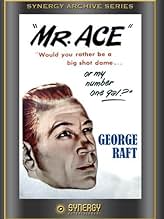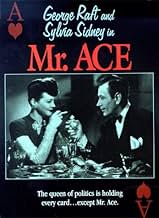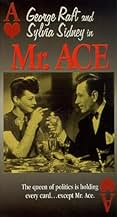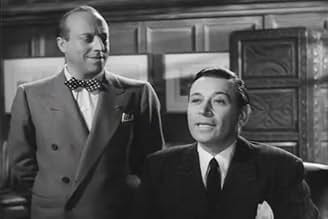A rich society woman uses a gangster to win a congressional election.A rich society woman uses a gangster to win a congressional election.A rich society woman uses a gangster to win a congressional election.
Joyce Bryant
- Nightclub Singer
- (as Joyce Bryant and the Flennoy Trio)
Stanley Andrews
- Tomahawk Club Boss
- (uncredited)
Walter Baldwin
- Bookie - Party Guest
- (uncredited)
Brooks Benedict
- Man Entering Elevator
- (uncredited)
Truman Bradley
- Radio Forum Moderator
- (uncredited)
Gordon B. Clarke
- Nightclub Pianist
- (uncredited)
James Conaty
- Party Guest
- (uncredited)
Lester Dorr
- Reporter at Party
- (uncredited)
Ben Erway
- Tomahawk Club Politico
- (uncredited)
Mary Field
- Lady with Question on Radio Forum
- (uncredited)
- Director
- Writer
- All cast & crew
- Production, box office & more at IMDbPro
Featured reviews
Sylvia Sidney is a wealthy woman who wants to be governor in "Mr. Ace" from 1946, also starring George Raft, with Stanley Ridges, and Jerome Cowan.
In order to have a chance at winning, Margaret (Sidney) has to get the backing of Eddie Ace, a political boss. Eddie doesn't want to endorse her. For one thing, he seems to have fallen for her; for another, she's an independent thinker, and he senses she won't follow instructions.
It's always fun to see a younger Sylvia Sidney. Here, with her hairdo and suit, she reminds me a little of Bette Davis. She gives a very good performance. Raft is his usual tough guy self.
The attitude toward women in politics in this film is interesting. It was a little more unusual back then that it is now, though there were some formidable women in the game, including Melvyn Douglas' wife Helen Gahagan Douglas, Nellie Taylor Ross, governor of Wyoming, and Miriam Ferguson in Texas. It's mentioned in the film that 29 members of the House of Representatives up to that time were women.
It's an okay watch.
In order to have a chance at winning, Margaret (Sidney) has to get the backing of Eddie Ace, a political boss. Eddie doesn't want to endorse her. For one thing, he seems to have fallen for her; for another, she's an independent thinker, and he senses she won't follow instructions.
It's always fun to see a younger Sylvia Sidney. Here, with her hairdo and suit, she reminds me a little of Bette Davis. She gives a very good performance. Raft is his usual tough guy self.
The attitude toward women in politics in this film is interesting. It was a little more unusual back then that it is now, though there were some formidable women in the game, including Melvyn Douglas' wife Helen Gahagan Douglas, Nellie Taylor Ross, governor of Wyoming, and Miriam Ferguson in Texas. It's mentioned in the film that 29 members of the House of Representatives up to that time were women.
It's an okay watch.
10ROCKY-19
This is an undervalued little political drama from an era when politics on the big screen suddenly became popular. While so many such films are based on saccharine preaching or play cute with the "women in politics" theme, there's not an ounce of sugar here.
Ambitious socialite congresswoman Margaret Chase (Sylvia Sidney) seeks the governor's office, and knows exactly how to use the crooked political system (and even her estranged husband) to get there. One thing she needs is the endorsement of the nefarious Tomahawk Club and its top dog, Mr. Ace (George Raft). Like any seasoned politician with more aspirations than ethics, she has no qualms with buddying up to the shady characters. Ace toys with her but is not one to be manipulated. Watch him watch her as he introduces her to his "friends" as if waiting for her to exhibit the same hypocritical benevolence of any male politician trying to curry favor - and she does. The passionate moral compass of the story is her former professor, Joshua Adams, who (for reasons that differ from Ace's) does not want her to be governor. There is a portrait of modern politics as Margaret believes she and Adams are manipulating Ace when in fact Ace and Adams are conspiring against her.
The script by Fred Finklehoff shows great restraint. We get only as much backstory as we absolutely need. The people are human; nobody is an innocent angel and no political bad guy is cackling into his cloak. As in real politics, everyone is trying to manipulate everyone else. Even in "romancing" each other, Margaret Chase and Eddie Ace are actually testing each other's political wills. No hearts and flowers here. This is a romance of black coffee and hard-boiled eggs.
And how refreshing to see actors of a "certain age" actually acting their ages. Sidney is a mature, dynamic woman, and gets to play one. Being attracted to Mr. Ace does not turn Margaret into a brainless flit, nor does Ace let the attraction drown his cynicism. She's more than willing to use backhanded tactics to get around him politically, and he responds by turning the system against her. Only then does she have a change of heart about the entire campaign. And only her obvious change of heart allows Ace to rethink his own motives.
Take note of Roman Bohnen as Prof. Adams. Amid all the professional politicians and their cold-blooded calculations he is the emotional voice of infuriated idealism. This same year ('46) Bohnen also appeared in the brilliant "The Best Years of Our Lives" as a completely different sort of character (Dana Andrews' soft-spoken, alcoholic father). He's simply remarkable.
"Mr. Ace" was the third of a trilogy of films Raft and Sidney did together. "Pick-Up" brought them together in the early '30s, "You and Me" in the late '30s, and then "Mr. Ace." Their natural chemistry ages like fine wine.
Ambitious socialite congresswoman Margaret Chase (Sylvia Sidney) seeks the governor's office, and knows exactly how to use the crooked political system (and even her estranged husband) to get there. One thing she needs is the endorsement of the nefarious Tomahawk Club and its top dog, Mr. Ace (George Raft). Like any seasoned politician with more aspirations than ethics, she has no qualms with buddying up to the shady characters. Ace toys with her but is not one to be manipulated. Watch him watch her as he introduces her to his "friends" as if waiting for her to exhibit the same hypocritical benevolence of any male politician trying to curry favor - and she does. The passionate moral compass of the story is her former professor, Joshua Adams, who (for reasons that differ from Ace's) does not want her to be governor. There is a portrait of modern politics as Margaret believes she and Adams are manipulating Ace when in fact Ace and Adams are conspiring against her.
The script by Fred Finklehoff shows great restraint. We get only as much backstory as we absolutely need. The people are human; nobody is an innocent angel and no political bad guy is cackling into his cloak. As in real politics, everyone is trying to manipulate everyone else. Even in "romancing" each other, Margaret Chase and Eddie Ace are actually testing each other's political wills. No hearts and flowers here. This is a romance of black coffee and hard-boiled eggs.
And how refreshing to see actors of a "certain age" actually acting their ages. Sidney is a mature, dynamic woman, and gets to play one. Being attracted to Mr. Ace does not turn Margaret into a brainless flit, nor does Ace let the attraction drown his cynicism. She's more than willing to use backhanded tactics to get around him politically, and he responds by turning the system against her. Only then does she have a change of heart about the entire campaign. And only her obvious change of heart allows Ace to rethink his own motives.
Take note of Roman Bohnen as Prof. Adams. Amid all the professional politicians and their cold-blooded calculations he is the emotional voice of infuriated idealism. This same year ('46) Bohnen also appeared in the brilliant "The Best Years of Our Lives" as a completely different sort of character (Dana Andrews' soft-spoken, alcoholic father). He's simply remarkable.
"Mr. Ace" was the third of a trilogy of films Raft and Sidney did together. "Pick-Up" brought them together in the early '30s, "You and Me" in the late '30s, and then "Mr. Ace." Their natural chemistry ages like fine wine.
Congresswoman Sylvia Sidney announces her candidacy for governor, and asks political boss George Raft for his support. He wines her and dimes her and tells her she cannot win, because beautiful women shouldn't be in politics. So she goes to another member of his machine and cuts a deal with him for the nomination in the one-party state.
Miss Sidney's character, named Margaret Wyndham Chase, is clearly modeled on Maine senator Margaret Chase Smith. She even wears the hideous hats that Mrs. Smith affected. The political machine, named the Tomahawk Club, is modeled on New York City's Tammany Hall.
One of the issues I have with Mr.Raft's performances in movies is his impenetrable mien. He says things, and they are things that he believes, it there is rarely any hint of what he is actually thinking. Here that actually works to the performance's benefit; he seems a character who is precise, intelligent and impenetrable. This leaves Miss Sidney to carry the emotional weight of this political romantic comedy.
This was a period during which Hollywood was making movies about practical politics and the effects of the machine. With the end of the Second World War, soldiers were coming home and expected changes. Capra tried a couple of movies, and even John Ford got together his non-western stock company for THE LAST HURRAH. By the time that came out, there were stirrings of change in society and politics, and the movies were no longer part of the National conversation. Nowadays, political movies usually have a sour, satirical edge to them.
Miss Sidney's character, named Margaret Wyndham Chase, is clearly modeled on Maine senator Margaret Chase Smith. She even wears the hideous hats that Mrs. Smith affected. The political machine, named the Tomahawk Club, is modeled on New York City's Tammany Hall.
One of the issues I have with Mr.Raft's performances in movies is his impenetrable mien. He says things, and they are things that he believes, it there is rarely any hint of what he is actually thinking. Here that actually works to the performance's benefit; he seems a character who is precise, intelligent and impenetrable. This leaves Miss Sidney to carry the emotional weight of this political romantic comedy.
This was a period during which Hollywood was making movies about practical politics and the effects of the machine. With the end of the Second World War, soldiers were coming home and expected changes. Capra tried a couple of movies, and even John Ford got together his non-western stock company for THE LAST HURRAH. By the time that came out, there were stirrings of change in society and politics, and the movies were no longer part of the National conversation. Nowadays, political movies usually have a sour, satirical edge to them.
Although George Raft plays the title role in Mr. Ace, the film such as it is really belongs to Sylvia Sidney as the ambitious Congresswoman who wants to become her state's first female governor. The Mr. Ace of the title is Eddie Ace, noted political boss in the state whose backing Sidney wants.
In fact two female governors had already been elected in the USA at the point in time Mr. Ace was made, Nellie Tayloe Ross in Wyoming and Miriam Ferguson in Texas. The script makes reference to both these ladies and to the 29 members of the House of Representatives that had been elected up to that point. It had been done before, but it was still a relatively new phenomenon.
For a smart political boss Raft sure gets his hormones involved in his decision making. His problem with Sidney is that she's tough and independent minded and won't take his orders or anything else from him. Raft's decision making is not coming from his head, that's for sure.
Sidney is also fighting an attraction to Raft as well even though she's married to Alan Edwards albeit they are estranged and do divorce during the film.
There's a whole lot of maneuvering done and at times it's more hormone driven than politically driven. These are supposed to be professional people you know.
Roman Bohnen plays Sidney's former political science professor and mentor in her younger days. He still appeals to the better angels of her nature. Sidney has two political operatives in Jerome Cowan and Sara Haden who do her bidding. Watch Haden's performance, a very understated one with definite lesbian undertones.
Sid Silvers is Raft's factotum and Stanley Ridges his rival within his own organization who Sidney successfully subverts for a while.
The emphasis of this film should have been on Sidney rather than Raft. Her's is the real story here and Mr. Ace would have been a better film had it been entitled Mrs. Chase.
Sidney's name in the film is Margaret Chase and in 1948 one Margaret Chase Smith won election to the United States Senate to become the first woman elected in her own right to that body without having been appointed by the state governor to fill a vacancy.
Mr. Ace does have its moments and one might want to view it just to see how things have so changed for women in politics.
In fact two female governors had already been elected in the USA at the point in time Mr. Ace was made, Nellie Tayloe Ross in Wyoming and Miriam Ferguson in Texas. The script makes reference to both these ladies and to the 29 members of the House of Representatives that had been elected up to that point. It had been done before, but it was still a relatively new phenomenon.
For a smart political boss Raft sure gets his hormones involved in his decision making. His problem with Sidney is that she's tough and independent minded and won't take his orders or anything else from him. Raft's decision making is not coming from his head, that's for sure.
Sidney is also fighting an attraction to Raft as well even though she's married to Alan Edwards albeit they are estranged and do divorce during the film.
There's a whole lot of maneuvering done and at times it's more hormone driven than politically driven. These are supposed to be professional people you know.
Roman Bohnen plays Sidney's former political science professor and mentor in her younger days. He still appeals to the better angels of her nature. Sidney has two political operatives in Jerome Cowan and Sara Haden who do her bidding. Watch Haden's performance, a very understated one with definite lesbian undertones.
Sid Silvers is Raft's factotum and Stanley Ridges his rival within his own organization who Sidney successfully subverts for a while.
The emphasis of this film should have been on Sidney rather than Raft. Her's is the real story here and Mr. Ace would have been a better film had it been entitled Mrs. Chase.
Sidney's name in the film is Margaret Chase and in 1948 one Margaret Chase Smith won election to the United States Senate to become the first woman elected in her own right to that body without having been appointed by the state governor to fill a vacancy.
Mr. Ace does have its moments and one might want to view it just to see how things have so changed for women in politics.
For all its professionalism and excellent music, this is not a very significant film. I actually fell asleep several times during the long gaps of any intrigue leading forward. It becomes interesting not until towards the end, but there is one very interesting character, who actually sustains the whole film: Roman Bohnen as the professor. He raises your interest the moment he first appears, and you look forward to his return throughout the film, which fortunately frequently is repeated. He is the only clever one, while the others are not very convincing. George Raft is always himself as a gangster, and it's impossible to ever like him - his name is enough to deter you from any film he is in. But Sylvia Sidney is even worse - she is probably the least possible convincing actress for a politician.
The twists towards the end save the intrigue and the script, which isn't bad, but the one thing lacking is credibility. They say that all is fair in politicis, but the end proves this wasn't politics at all but merely the old worn-out story of bitter opponents ending up as lovers.
The twists towards the end save the intrigue and the script, which isn't bad, but the one thing lacking is credibility. They say that all is fair in politicis, but the end proves this wasn't politics at all but merely the old worn-out story of bitter opponents ending up as lovers.
Did you know
- Trivia"The Hedda Hopper Show - This Is Hollywood" broadcast a 30 minute radio adaptation of the movie on January 25, 1947 with George Raft and Sylvia Sidney reprising their film roles.
- Quotes
Margaret Wyndham Chase: You'll make a very impressive governor's husband, darling.
Details
- Release date
- Country of origin
- Language
- Also known as
- Uma Mulher no Poder
- Production company
- See more company credits at IMDbPro
- Runtime1 hour 24 minutes
- Color
- Aspect ratio
- 1.37 : 1
Contribute to this page
Suggest an edit or add missing content







































